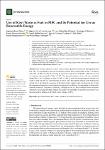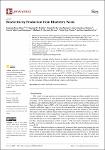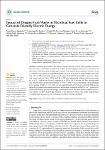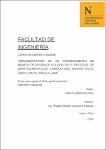| dc.contributor.author | Rojas Flores, Segundo | |
| dc.contributor.author | De La Cruz Noriega, Magaly | |
| dc.contributor.author | Cabanillas Chirinos, Luis | |
| dc.contributor.author | Benites, Santiago M. | |
| dc.contributor.author | Nazario Naveda, Renny | |
| dc.contributor.author | Delfin Narciso, Daniel | |
| dc.contributor.author | Gallozzo Cardemas, Moisés | |
| dc.contributor.author | Díaz, Felix | |
| dc.contributor.author | Murga Torres, Emzon | |
| dc.contributor.author | Rojas Vilacorta, Walter | |
| dc.date.accessioned | 2023-10-24T16:20:13Z | |
| dc.date.available | 2023-10-24T16:20:13Z | |
| dc.date.issued | 2023-05-08 | |
| dc.identifier.citation | Rojas, S., De La Cruz, M., Cabanillas, L., Benites, S. M., Nazario, R., Delfin, D., Gallozzo, M., Díaz, F., Murga, E., & Rojas, W. (2023). Use of Kiwi Waste as Fuel in MFC and Its Potential for Use as Renewable Energy. Fermentation, 9, 1-6. https://doi.org/10.3390/fermentation9050446 | es_PE |
| dc.identifier.other | . | es_PE |
| dc.identifier.uri | https://hdl.handle.net/11537/34735 | |
| dc.description.abstract | This research aimed to use kiwi waste as fuel to generate bioelectricity through microbial fuel cells. It was possible to generate an electrical current and voltage peaks of 3.807 ± 0.102 mA and 0.993 ± 0.061 V on day 11, showing an electrical conductivity of 189.82 ± 3.029 mS/cm and an optimum operating pH of 5.966 ± 0.121. The internal resistance of the cells was calculated using Ohm’s Law, resulting in a value of 14.957 ± 0.394 Ω, while the maximum power density was 212.68 ± 26.84 mW/m2 at a current density of 4.506 A/cm2. Through the analysis of the FTIR spectra carried out on the substrate, a decrease in the characteristic organic peaks was observed due to their decomposition during the electricity-generation process. In addition, it was possible to molecularly identify the bacteria Comamonas testosteroni, Sphingobacterium sp., and Stenotropho-monas maltophila adhered to the anodized biofilm. Finally, the capacity of this residue to generate bioelectricity was demonstrated by lighting an LED bulb with a voltage of 2.85 V. | es_PE |
| dc.format | application/pdf | es_PE |
| dc.language.iso | spa | es_PE |
| dc.publisher | Multidisciplinary Digital Publishing Institute (MDPI) | es_PE |
| dc.rights | info:eu-repo/semantics/openAccess | es_PE |
| dc.rights.uri | https://creativecommons.org/licenses/by-nc-sa/4.0/ | * |
| dc.source | Universidad Privada del Norte | es_PE |
| dc.source | Repositorio Institucional - UPN | es_PE |
| dc.subject | Agricultural waste | es_PE |
| dc.subject | Bioelectricity | es_PE |
| dc.subject | Kiwi waste | es_PE |
| dc.subject | Microbial fuel cells | es_PE |
| dc.title | Use of Kiwi Waste as Fuel in MFC and Its Potential for Use as Renewable Energy | es_PE |
| dc.type | info:eu-repo/semantics/article | es_PE |
| dc.publisher.country | PE | es_PE |
| dc.identifier.journal | Fermentation | es_PE |
| dc.description.peer-review | Artículo científico | es_PE |
| dc.subject.ocde | https://purl.org/pe-repo/ocde/ford#2.02.01 | es_PE |
| dc.description.sede | Trujillo San Isidro | es_PE |
| dc.identifier.doi | https://doi.org/10.3390/fermentation9050446 | |







